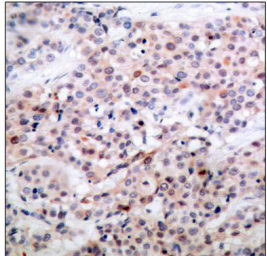Anti-Bcl-2 (Phospho-Thr56) Antibody (43064)
Data
- -
- -
Antibody DetailsProduct DetailsReactivity Species Human Host Species Rabbit Immunogen Peptide sequence that includes phosphorylation site of threonine 56 (G-H-T(p)-P-H) derived from human Bcl-2 and conjugated to KLH. Product Concentration 1.0 mg/ml Formulation PBS (without Mg2 and Ca2 ), pH 7.4, 150mM NaCl, 0.02% sodium azide and 50% glycerol. State of Matter Liquid Product Preparation Affinity-purified on phosphopeptide; non-phosphopeptidereactive antibodies were removed by chromatography on non-phosphorylated peptide Storage and Handling This antibody is stable for at least one (1) year at -20°C. Country of Origin USA Shipping Next Day 2-8°C Applications and Recommended Usage? Quality Tested by Leinco Immunohistochemistry: use at dilution of 1:50-1:100. These are recommended working dilutions. End user should determine optimal dilutions for their application. Each investigator should determine their own optimal working dilution for specific applications. See directions on lot specific datasheets, as information may periodically change. DescriptionSpecificity Rabbit Polyclonal Antibody specific to Bcl-2 (Phospho-Thr56) Background Bcl-2 protein suppresses apoptosis in a variety of cellular systems including factor-dependent lymphohematopoietic and neural cells. It regulates cell death by controlling the mitochondrial membrane permeability and appears to function in a feedback loop system with caspase. Bcl-2 inhibits caspase acativity either by preventing release of cytochrome c from the mitochondria and/or by binding to apoptosis-activating factor (Apaf-1). The predicted molecular weight of Bcl-2 is ~26kDa. Antigen DetailsFunction Suppresses apoptosis in a variety of cell systems including factor-dependent lymphohematopoietic and neural cells (PubMed:1508712, PubMed:8183370). Regulates cell death by controlling the mitochondrial membrane permeability (PubMed:11368354). Appears to function in a feedback loop system with caspases (PubMed:11368354). Inhibits caspase activity either by preventing the release of cytochrome c from the mitochondria and/or by binding to the apoptosis-activating factor (APAF-1) (PubMed:11368354). Also acts as an inhibitor of autophagy: interacts with BECN1 and AMBRA1 during non-starvation conditions and inhibits their autophagy function (PubMed:18570871, PubMed:21358617, PubMed:20889974). May attenuate inflammation by impairing NLRP1-inflammasome activation, hence CASP1 activation and IL1B release (PubMed:17418785). {PubMed:1508712, PubMed:17418785, PubMed:18570871, PubMed:20889974, PubMed:21358617, PubMed:8183370, PubMed:11368354}. NCBI Gene Bank ID UniProt.org Research Area Phosphospecific Antibodies References & Citations |



